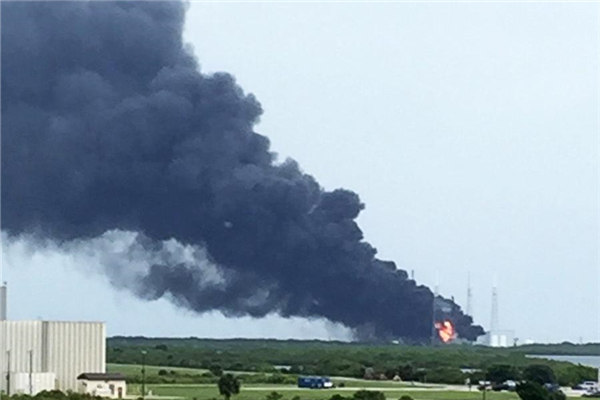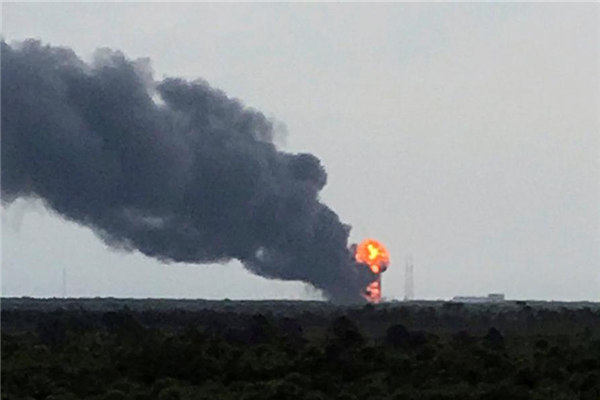Rocket explodes on launch pad in blow to Elon Musk's SpaceX
Updated: 2016-09-02 03:45
(Agency)
|
||||||||
 |
|
An explosion on the launch site of a SpaceX Falcon 9 rocket is shown in Cape Canaveral, Florida September 1, 2016. (Photo/Agency) |
SpaceX said there were no injuries and that an "anomaly" during the static fire test resulted in the loss of the rocket and a communications satellite owned by Israel-based Space Communication which was going to be used by Facebook
to expand internet access in Africa.
Video showed a fiery blast ripping through the upper part of the rocket before the vehicle collapsed in flames on the launch pad at Cape Canaveral Air Force Station just after 9 a.m. ET (1300 GMT). A plume of black smoke poured into the air.
Musk, a billionaire entrepreneur who helped found Tesla Motors, said on Twitter that the rocket's loss occurred while it was being filled with propellant and the problem originated around the upper stage oxygen tank.
"Cause still unknown. More soon," Musk tweeted.
 |
|
An explosion on the launch site of a SpaceX Falcon 9 rocket is shown in Cape Canaveral, Florida September 1, 2016. (Photo/Agency) |
People in buildings far from the facility felt shock waves, but local authorities said residents were not at risk.
Robin Seemangal, a space reporter with the Observer newspaper, quoted a source at the facility who said it felt like the office they were in had been hit by lightning.
"We actually thought the building was collapsing, it shook us so bad," Seemangal wrote in a tweet, quoting his source.
SpaceX had been due to launch its 29th Falcon 9 rocket, which carries a list price of $62 million, before dawn on Saturday, carrying the Spacecom-owned AMOS-6.
Facebook would have been among the customers for bandwidth on that satellite. Last year, Facebook said it was partnering with Eutelsat Communications to boost data connectivity to large parts of Sub-Saharan Africa.
Thursday's explosion could derail the sale of Spacecom for $285 million to Beijing Xinwei Technology Group. The companies unveiled the agreement last week, but said it was contingent on the successful launch of the satellite and completion of its in-orbit tests.
In a statement to the Tel Aviv Stock Exchange, Spacecom said the satellite's loss will have "a significant impact" on the company, and it would continue to provide updates. Its shares closed down 8.9 percent at 38.95 shekels.
The Federal Aviation Administration, which oversees commercial rocket launches in the United States, will work with SpaceX to understand the cause of the accident, an agency spokesman said.
FACEBOOK 'DISAPPOINTED'
In a post from Africa, Facebook founder Mark Zuckerberg said he was deeply disappointed at the loss of the satellite which he said would have provided connectivity to many entrepreneurs and others across the continent.
"We remain committed to our mission of connecting everyone, and we will keep working until everyone has the opportunities this satellite would have provided," he wrote.
Eutelsat said it also regretted the loss, but that it remained committed to growing broadband in Africa. The potential impact on its revenues was estimated at up to 50 million euros by 2019, the company said in a statement.
SpaceX had planned to dispatch as many as nine more missions before the end of the year, including two flights to place a 20-member satellite network into orbit for Iridium.
It was due to launch its next mission in November to fly cargo to the International Space Station for NASA. SpaceX is one of two companies that transports cargo to the orbiting laboratory, which flies 250 miles (400 km) above Earth.
"NASA still is assessing what impacts, if any, the incident will have on future missions," spokesman Michael Curie said in an email.
Shares of Musk's companies Tesla Motors and SolarCity were down 4 percent at $203.65 and 5.5 percent at $19.50 respectively in morning trade.
R.W. Baird analyst Ben Kallo said those share price moves were in response to a disclosure on Wednesday by Tesla, which has agreed to buy SolarCity, that it would need to raise additional funds, and not to the explosion in Florida.
SpaceX says it has a backlog of more than $10 billion in launch orders from customers including NASA and commercial companies. On Wednesday, it said it had signed its first customer to use a previously flown Falcon 9 rocket, but that launch was not due until later this year. The rocket that blew up on Thursday had never been flown before.
Eric Stallmer, president of the Commercial Spaceflight Federation, a Washington-based trade association, said he had the utmost confidence in SpaceX's ability to bounce back.
"The industry as a whole, including SpaceX, is very resilient and determined and will learn from today's incident and continue to move forward," Stallmer said.
The Hawthorne, California-based company was founded by Musk in 2002 and began launching its Falcon 9 rockets in June 2010, racking up 27 successful flights and one failure in a little more than six years.
SpaceX had recovered from a June 2015 launch accident that destroyed a load of cargo headed for the space station.
Earlier this year, it successfully broke a monopoly by United Launch Alliance, a partnership of Lockheed Martin and Boeing, to win a military satellite launch contract.
The pad where SpaceX's rocket was being prepared for launch is one of two operated by the company. Its other site is at Vandenberg Air Force Base in California.
Musk set up SpaceX with the goal of slashing launch costs to make travel to Mars affordable. The company plans to fly its first unmanned spacecraft to Mars in 2018 and to send humans to the red planet as early as 2024.
Musk is expected to unveil details of his Mars program at the International Astronautical Congress in Guadalajara, Mexico, next month.
- Record number of Americans dislike Hillary Clinton: poll
- Mexico contradicts Trump on paying for border wall, clouding visit
- First direct commercial flight from US in over 50 years arrives in Cuba
- Typhoon kills 9 in Japan's old people's home as toll hits 11
- Brazil leader's impeachment trial enters final stretch
- 94th anniv. of Victory Day marked in Turkey

 Korean ethnic dance drama shines in Beijing
Korean ethnic dance drama shines in Beijing
 Children explore science and technology at museum
Children explore science and technology at museum
 Children wearing Hanfu attend writing ceremony
Children wearing Hanfu attend writing ceremony
 73rd Venice Film Festival opens in Italy
73rd Venice Film Festival opens in Italy
 'World's most dangerous village' draws visitors
'World's most dangerous village' draws visitors
 Chinese female pilots fly fighter-bomber JH-7
Chinese female pilots fly fighter-bomber JH-7
 African trainees learn lion dance in NE China's Dalian
African trainees learn lion dance in NE China's Dalian
 Left-behind children back to hometown after spending summer with family
Left-behind children back to hometown after spending summer with family
Most Viewed
Editor's Picks

|

|

|

|

|

|
Today's Top News
Trump outlines anti-terror plan, proposing extreme vetting for immigrants
Phelps puts spotlight on cupping
US launches airstrikes against IS targets in Libya's Sirte
Ministry slams US-Korean THAAD deployment
Two police officers shot at protest in Dallas
Abe's blame game reveals his policies failing to get results
Ending wildlife trafficking must be policy priority in Asia
Effects of supply-side reform take time to be seen
US Weekly

|

|







